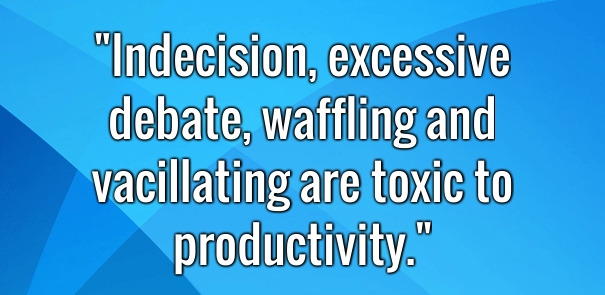You’re busy; I’m busy; we’re all busy. That’s life in the big city — and the small town — and it’s not likely to change. But the way we perceive and handle busyness has a profound impact on our lives and success.
My upcoming book “Expensive Sentences” devotes a chapter to the common claim “We’re too swamped to deal with that now” and how it costs time, money and opportunity. Paradoxically, this dodge often makes us busier. This excerpt unpacks the specific danger of postponing decisions and presents a simple tool to avoid this trap.
The cost of revisiting
My mother would often remind me that “not to decide is to decide.” That’s an insightful truth about many of life’s activities. If we postpone a decision about joining a group, taking a class or starting a hobby, those opportunities are often overcome by events. Then, as the popular quote goes, “Life is what happens to you while you’re busy making other plans.”
But sometimes too much of life becomes making plans when a poorly contained decision-making process oozes into days and weeks. In those cases, the cost of indecision extends beyond the missed opportunity. The shot-we-don’t-take or decision-we-don’t-make lingers unresolved, sucking up more time and mental energy every time we revisit it.
Decisions are like accordions
My wife picked out our wedding cake in 15 minutes. We happened upon a nice-looking bakery between appointments, strolled in and got it done. There were no subsequent discussions about “gosh, maybe we should get the strawberry filling” or “is four tiers too much?” It was a short engagement, so we had to plan fast, and we needed to tend to other details. (For the record, no one complained about the cake, and I can’t actually remember how many tiers it had.)
I hesitate to criticize those who spend 18 months planning a wedding; it is, after all, a unique event. But the marriage celebration is a familiar example of how planning and decision time will expand like an accordion to fill the schedule we permit.
How long does it take to plan a wedding? The true answer is: It takes from now until the day before the wedding. Choosing invitations can take 10 minutes or six months. How much time have you got? (The parallel question of “How much does a wedding cost?” has the same answer.)
A simple choice to contain decision-making
The expanding quality of decisions and tasks is not limited to weddings. How long does it take to choose a marketing vendor? To decide on a company mission statement? To set the lunch menu for a board meeting? To pick out the right outfit? To write an email message?
I don’t suggest that those items are of equal importance; clearly they are not. But any of them could vary one-hundredfold in the time and energy they consume. Claiming “we’re too busy to decide now” may not advance the issue or improve the quality of the decision, but it will certainly add time and cost to the process. If you come back to that decision again and again, revisiting it will carry a substantial cost.
Indecision, excessive debate, waffling and vacillating are toxic to productivity. To avoid that poison, always elect one of two paths when faced with a team decision:
- Decide. Make the call of Yea or Nay, Go or No-go.
- Decide to decide later. Make a specific appointment in the future—choose a date and time—to revisit the decision.
Postponement can be the right path; your team may be better equipped to decide with the benefit of future information. But would you ever say, “Instead of deciding this now, let’s spend 20 minutes a day thinking and talking about it for the next three months. How does that sound?”
While that course would never be intentional, the issue could play out that way if you don’t either reach a conclusion now or decide to resume discussion at a specific later date — and not before.
Jack Quarles is a speaker, consultant, and the author or co-author of bestsellers “Same Side Selling,” “How Smart Companies Save Money,” and the upcoming “Expensive Sentences” (Ideapress Publishing, January 2017). He advises companies and serves on several non-profit boards. Find him on LinkedIn or at www.JackQuarles.com.
If you enjoyed this article, join SmartBrief’s e-mail list for our daily newsletter for entrepreneurs and startups..
